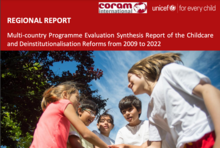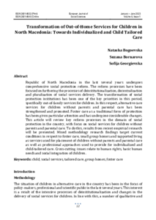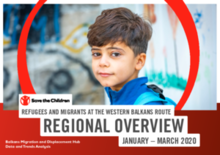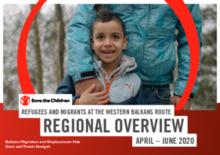Displaying 1 - 10 of 21
This article, from EuroChild, notes how in August 2025, North Macedonia took a significant stride toward strengthening child welfare by officially adopting its National Action Plan on the Rights of the Child for 2025–2029.
This report presents the main findings, conclusions, and recommendations of a formative and summative evaluation of the childcare and deinstitutionalisation reforms in North Macedonia for the period of 2009 2022. The evaluation was commissioned by the United Nations Children’s Fund (UNICEF) Europe and Central Asia Region Office (ECARO), as part of its multi-country evaluation of the impact of national child care reforms across eight1 countries in Europe and Central Asia and was conducted by Coram International.
This report presents the main findings, conclusions, and recommendations of an evaluation of the child care and deinstitutionalisation reforms in seven countries in the Europe and Central Asia Region (Bulgaria, Georgia, Moldova, Montenegro, Northern Macedonia, Serbia and Tajikistan). The report offers valuable insights into the effectiveness of child protection systems and the transition from institutional care to family- and community-based alternatives. It highlights key achievements, lessons learned, and best practices, while also addressing the areas where further improvements are needed to ensure that every child can grow up in a nurturing, safe, and supportive environment.
This article reviews the key reform processes in the domain of social protection in the the Republic of North Macedonia, with a focus on social services for children without parents and parental care.
Researchers are increasingly using self-report measures of physical, psychological, and sexual violence and neglect for population-based surveys. The current gold-standard measure, the 45-item ISPCAN Child Abuse Screening Tool has been used across the world. This study assesses its adequacy for measuring abuse across countries.
This report describes key trends in migrations in the region, detailing information about the number of people on the move, demography (age, sex, country of origin, etc), behavioral patterns, and routes in use - with a focus on children, particularly unaccompanied children.
Data and Trend Analysis (DATA) Refugees and Migrants at the Western Balkans Route Regional Overview, covering period April – June 2020, describes key trends in migrations in the region, detailing information about the number of people on the move, demography (age, sex, country of origin, etc), behavioral patterns, and routes in use - with a focus on children, particularly unaccompanied children.
Join this webinar to walk through the PROMISE Child Participation Tool and to discuss approaches and considerations for soliciting children’s views on their Barnahus experience.
The purpose of this webinar is to shed light on the specific experiences and issues of unaccompanied and separate girls in the European Response.
UNICEF is seeking a national expert to provide technical support to the Ministry of Labour and Social Policy in strengthening of the foster care system in the country.





